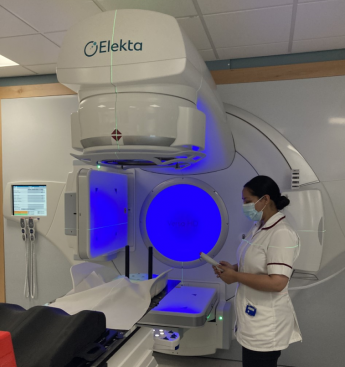
One year after launching the lifesaving SABR (stereotactic ablative radiotherapy) service, the team at Royal Sussex County Hospital are celebrating a successful program roll out.
The SABR service was first launched at University Hospitals Sussex last year and has now treated almost 30 patients who were either considered inoperable or who did not wish to go down a surgical route.
SABR uses multiple beams of radiation which are carefully directed from different angles to meet at the tumour. Sophisticated image guidance technology takes account of breathing motion which can cause movement of the tumour, to ensure that these beams are targeted with great accuracy.
This allows higher doses of radiation to be safely delivered at each treatment session, thereby cutting the number of hospital visits that potentially vulnerable cancer patients need to make.
This treatment was initially aimed at treating patients with non-small cell lung cancers only but was recently extended to include other cancers.
This summer, the Brighton team finished treating their first patient with oligometastic cancer – this is a condition where cancer cells from the primary cancer escape and travel through the body to form a small number of new tumours in other parts of the body. After completing their course of five sessions, this first patient is doing well with no issues post-treatment.
Danielle Payne, Lead Stereotactic Radiotherapy Radiographer, said: “Building something from the ground up has been a great experience, and to see it going from strength to strength is really exciting. A lot of the patients that go through for this treatment are not suitable for any other course of treatment, so being able to offer something that is life changing for these patients is incredible.”
“We hope to be doing more treatments and offering a wider range of techniques and therapies to cancer patients in Sussex.”
Anna Britten, SABR Clinical Lead explains: “For a lot of our lung cancer patients, it is the only option for a curative treatment.”
“Ablation means destruction, so wherever we ablate with our SABR, there should no longer be cancer in that treated area. This is very high-end technology that needs a lot of investment, skill and expertise, which is why we are so proud of our patient outcomes, and grateful to be able to offer this service to our patients.”
Peter Tuppen, 79, from Peacehaven, had a tumour in his lung. He became the first patient in Sussex to be treated with this type of cancer treatment. Twelve months on, Peter remains at home with his wife, Helen, of 43 years, who is grateful they can still spend time together.

Helen said: “When we first got the news Pete had cancer, that was scary, especially as we had lost a lot of friends to lung cancer. For Pete to be told he had got it, it was hard. This treatment was done in Brighton in only five sessions, which worked out very well and was definitely more convenient.”
“After the treatment he was quite tired, but that was the only side effect, which was a great outcome overall.”
As a result of his treatment, Peter is suffering no long-term issues and his most recent scan showed no recurrence or spread of the lung cancer.
Helen explained: “Pete’s doing well and having regular scans at the moment which are all coming out clear. We’re just happy to be able to spend time together at home.”
A conventional radiotherapy lung treatment requires a minimum of 20 daily treatments. However, SABR can treat these patients in as few as three, thereby being more convenient for patients and their relatives.
The SABR service is now fully booked until September, with patients coming through with cancers that have spread to their bones and lymph nodes.
The team are looking forward to the future and hope to safely roll out this service to other organs, including the adrenal, liver and spine. This will hopefully give cancer patients in Sussex the best opportunity to control their cancers, and a better quality of life.